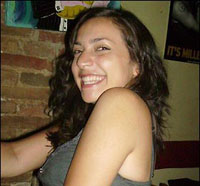Specialists to decide whether further tests on body needed in British student slain
Experts are planning to decide on Tuesday whether a new postmortem should be done in the case of the British student murder in Perugia.

Lawyers for one of the suspects in the slaying and sexual assault of Meredith Kercher pushed for new tests to better determine how and at what time the 21-year-old woman died.
Kercher family lawyer Francesco Maresca told reporters in Perugia on Monday that he hoped the autopsy will not be needed, allowing the woman's body to be buried soon in Britain, where it was flown on Nov. 11.
"We hope that further tests on the body are not going to be needed," Maresca said.
The lawyer had said previously that the experts might be able to work using tissue samples and other biological material preserved from the initial autopsy shortly after Kercher was found dead Nov. 2 in her rented apartment. Outside experts began additional tests using some of that material on Monday.
An Italian coroner said that she died from a stab wound to the neck, and prosecutors said she was killed resisting a sexual assault.
Defense lawyers pressed for new tests to better establish time and cause of death.
Three people are jailed in the probe of the murder: Kercher's roommate, Amanda Marie Knox, 20, a University of Washington student from Seattle; Knox's then-boyfriend, Italian Raffaele Sollecito; and Rudy Hermann Guede, an Ivory Coast native who is awaiting extradition to Italy after his arrest in Germany.
A fourth suspect, Diya "Patrick" Lumumba, a Congolese who runs a bar in Perugia, was recently released from jail for lack of evidence.
All four suspects deny any role in Kercher's slaying.
Guede has admitted that he was in Kercher's room the night she died, but said he didn't kill her and that an Italian who is trying to frame him did. DNA testing has confirmed that Guede had sex with Kercher the night of the murder.
Based on the autopsy and accounts by Kerchers' friends of when she ate dinner with them on Nov. 1, the woman is believed to have died between 9 p.m. and 11 p.m. on Nov. 1, according to the judge who ordered the three suspects held.
However, Maresca has said it is believed that Kercher might have eaten something in the house after she returned from dinner, which could influence the determination of time of death. The state of digestion of a victim's last meal is commonly used in helping to determine time of death.
Subscribe to Pravda.Ru Telegram channel, Facebook, RSS!





